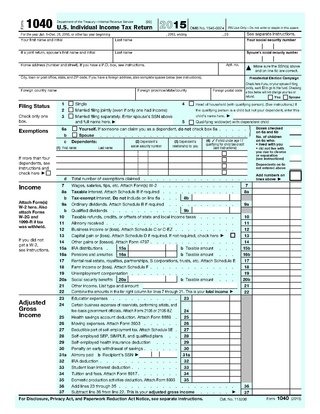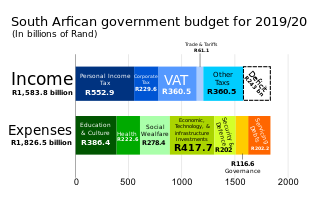See also
- Internal Revenue Service Official website
- Taxable income
- ↑ "Character (income tax)" . Retrieved 2016-03-04.
- ↑ "Character income tax" . Retrieved 2016-03-01.
Character is the type of income to calculate the taxpayer's tax liability [1] [2] . In the United States, the Supreme Court decided ( Commissioner v. Glenshaw Glass Co.) that income is an accession to wealth, however, the capital gain is of different character from ordinary income. Ordinary income includes earned wage income and interest income from lending.
The IRS characterizes income or loss as a capital gain or loss depending on how the taxpayer generates the gain or loss. When the taxpayer invests in real estate or security and then later sells that piece of real estate or security, the IRS characterizes the amount that exceeds the purchase price as capital income while the amount that falls short of the purchase price is capital loss. The IRS refers to the purchase price as the tax basis.
When the IRS characterizes income as capital gain, it enjoys a lower tax rate than ordinary income.
The IRS characterizes ordinary income as income generated from earned wage income or interest income earned from lending.
The IRS taxes ordinary income according to a progressive rate determined by the amount of income. It is a progressive income tax.

The United States of America has separate federal, state, and local governments with taxes imposed at each of these levels. Taxes are levied on income, payroll, property, sales, capital gains, dividends, imports, estates and gifts, as well as various fees. In 2020, taxes collected by federal, state, and local governments amounted to 25.5% of GDP, below the OECD average of 33.5% of GDP. The United States had the seventh-lowest tax revenue-to-GDP ratio among OECD countries in 2020, with a higher ratio than Mexico, Colombia, Chile, Ireland, Costa Rica, and Turkey.
Capital gain is an economic concept defined as the profit earned on the sale of an asset which has increased in value over the holding period. An asset may include tangible property, a car, a business, or intangible property such as shares.
A Roth IRA is an individual retirement account (IRA) under United States law that is generally not taxed upon distribution, provided certain conditions are met. The principal difference between Roth IRAs and most other tax-advantaged retirement plans is that rather than granting a tax reduction for contributions to the retirement plan, qualified withdrawals from the Roth IRA plan are tax-free, and growth in the account is tax-free.

A taxpayer is a person or organization subject to pay a tax. Modern taxpayers may have an identification number, a reference number issued by a government to citizens or firms.
A capital gains tax (CGT) is the tax on profits realized on the sale of a non-inventory asset. The most common capital gains are realized from the sale of stocks, bonds, precious metals, real estate, and property.
Negative gearing is a form of financial leverage whereby an investor borrows money to acquire an income-producing investment and the gross income generated by the investment is less than the cost of owning and managing the investment, including depreciation and interest charged on the loan. The investor may enter into a negatively geared investment expecting tax benefits or the capital gain on the investment after it is sold to exceed the accumulated losses of holding the investment. The investor would take into account the tax treatment of negative gearing, which may generate additional benefits to the investor in the form of tax benefits if the loss on a negatively geared investment is tax-deductible against the investor's other taxable income and if the capital gain on the sale is given a favourable tax treatment.
Passive income is unearned income that is acquired automatically with minimal labor to earn or maintain. It is often combined with another source of income, such as a side job. In the United States, the IRS divides income into three categories: active income, passive income, and portfolio income. Passive income, as an acquired income, is the result of capital growth or is related to the tax deduction mechanism, and is taxable.
Nonrecourse debt or a nonrecourse loan is a secured loan (debt) that is secured by a pledge of collateral, typically real property, but for which the borrower is not personally liable. If the borrower defaults, the lender can seize and sell the collateral, but if the collateral sells for less than the debt, the lender cannot seek that deficiency balance from the borrower—its recovery is limited only to the value of the collateral. Thus, nonrecourse debt is typically limited to 50% or 60% loan-to-value ratios, so that the property itself provides "overcollateralization" of the loan.

Income taxes in the United States are imposed by the federal government, and most states. The income taxes are determined by applying a tax rate, which may increase as income increases, to taxable income, which is the total income less allowable deductions. Income is broadly defined. Individuals and corporations are directly taxable, and estates and trusts may be taxable on undistributed income. Partnerships are not taxed, but their partners are taxed on their shares of partnership income. Residents and citizens are taxed on worldwide income, while nonresidents are taxed only on income within the jurisdiction. Several types of credits reduce tax, and some types of credits may exceed tax before credits. An alternative tax applies at the federal and some state levels.
Income tax in Australia is imposed by the federal government on the taxable income of individuals and corporations. State governments have not imposed income taxes since World War II. On individuals, income tax is levied at progressive rates, and at one of two rates for corporations. The income of partnerships and trusts is not taxed directly, but is taxed on its distribution to the partners or beneficiaries. Income tax is the most important source of revenue for government within the Australian taxation system. Income tax is collected on behalf of the federal government by the Australian Taxation Office.
A wash sale is a sale of a security at a loss and repurchase of the same or substantially identical security shortly before or after. Losses from such sales are not deductible in most cases under the Internal Revenue Code in the United States. Wash sale regulations disallow an investor who holds an unrealized loss from accelerating a tax deduction into the current tax year, unless the investor is out of the position for some significant length of time. A wash sale can take place at any time during the year, or across year boundaries.
Under Section 1031 of the United States Internal Revenue Code, a taxpayer may defer recognition of capital gains and related federal income tax liability on the exchange of certain types of property, a process known as a 1031 exchange. In 1979, this treatment was expanded by the courts to include non-simultaneous sale and purchase of real estate, a process sometimes called a Starker exchange.
In economics, personal income refers to an individual's total earnings from wages, investment enterprises, and other ventures. It is the sum of all the incomes received by all the individuals or household during a given period. Personal income is that income which is received by the individuals or households in a country during the year from all sources. In general, it refers to all products and money that you receive.
In the United States of America, individuals and corporations pay U.S. federal income tax on the net total of all their capital gains. The tax rate depends on both the investor's tax bracket and the amount of time the investment was held. Short-term capital gains are taxed at the investor's ordinary income tax rate and are defined as investments held for a year or less before being sold. Long-term capital gains, on dispositions of assets held for more than one year, are taxed at a lower rate.
The history of taxation in the United States begins with the colonial protest against British taxation policy in the 1760s, leading to the American Revolution. The independent nation collected taxes on imports ("tariffs"), whiskey, and on glass windows. States and localities collected poll taxes on voters and property taxes on land and commercial buildings. In addition, there were the state and federal excise taxes. State and federal inheritance taxes began after 1900, while the states began collecting sales taxes in the 1930s. The United States imposed income taxes briefly during the Civil War and the 1890s. In 1913, the 16th Amendment was ratified, however, the United States Constitution Article 1, Section 9 defines a direct tax. The Sixteenth Amendment to the United States Constitution did not create a new tax.
Taxpayers in the United States may have tax consequences when debt is cancelled. This is commonly known as cancellation-of-debt (COD) income. According to the Internal Revenue Code, the discharge of indebtedness must be included in a taxpayer's gross income. There are exceptions to this rule, however, so a careful examination of one's COD income is important to determine any potential tax consequences.
Depreciation recapture is the USA Internal Revenue Service (IRS) procedure for collecting income tax on a gain realized by a taxpayer when the taxpayer disposes of an asset that had previously provided an offset to ordinary income for the taxpayer through depreciation. In other words, because the IRS allows a taxpayer to deduct the depreciation of an asset from the taxpayer's ordinary income, the taxpayer has to report any gain from the disposal of the asset as ordinary income, not as a capital gain.
The alternative minimum tax (AMT) is a tax imposed by the United States federal government in addition to the regular income tax for certain individuals, estates, and trusts. As of tax year 2018, the AMT raises about $5.2 billion, or 0.4% of all federal income tax revenue, affecting 0.1% of taxpayers, mostly in the upper income ranges.

In general, the United States federal income tax is progressive, as rates of tax generally increase as taxable income increases, at least with respect to individuals that earn wage income. As a group, the lowest earning workers, especially those with dependents, pay no income taxes and may actually receive a small subsidy from the federal government.

Taxation may involve payments to a minimum of two different levels of government: central government through SARS or to local government. Prior to 2001 the South African tax system was "source-based", where in income is taxed in the country where it originates. Since January 2001, the tax system was changed to "residence-based" wherein taxpayers residing in South Africa are taxed on their income irrespective of its source. Non residents are only subject to domestic taxes.